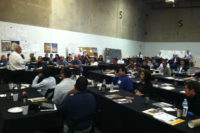In my role as Stone World editor, I report on stone fabrication shops across the country on a regular basis. When I ask them what their biggest challenge is (other than the economy), the answer is invariably, "Finding and training good employees."
With this in mind, I was astonished to read the results of the current industry poll at www.stoneworld.com, which reports that today's fabrication shops find themselves to be far too busy to participate in educational programs.
When we re-launched our magazine's Web site at www.stoneworld.com last year, we added a poll question to get some feedback from our readers on current stone industry issues. Personally, I am a big fan of these poll questions on informational Web sites (although to be honest, I'm usually answering questions like, "Should the New York Jets dump their quarterback?"). Seriously, though, I think that they offer a snapshot of what stone industry members are thinking at a given time, and we've gotten some excellent response. In this case, the specific question was "How much education is necessary in today's stone industry?" and there were four possible answers:
- This industry is always changing. I think shop managers and employees should attend as many educational sessions as they realistically can.
- If you get out to one or two education sessions a year, that should bring you up to speed.
- There's always a need for education, but there aren't any worthy educational opportunities out there.
- Our shop is too busy for me or my employees to be attending education sessions.
I should note here that part of my surprise comes from the high level of interest I saw at the StonExpo/Marmomacc Americas education series in Las Vegas in January. In this recession, no one is going to this show to party anymore, and it showed in the attendance at the seminars. In particular, I noticed that the two open "Fabricator Forums" saw the greatest participation they've had in several years, and a recap of one of these sessions can be found in the "How-To" section of this E-Newsletter. Also of interest, while both of these forums had a specific area of interest -- one for fabrication and one for countertop installation -- they both saw a great deal of inquiries that dealt with how to run a stone fabrication business. This underscores the need for more specific education in this field. This is not a pitch (and if any of you know me, you know I don't pitch), but the Marble Institute of America/Stone World Industry Education is offering exactly that, with education aimed at the management/owner level.
Read for yourself at www.stoneindustryeducation.com. I'd like to make one other point about the education sessions that I have attended in recent months: They are not overrun with people who are new to the stone industry and are still wet behind the ears. There is always a healthy presence of industry veterans at these events, and they seem to have as many questions as anyone else in the room. At a session in Massachusetts last year, I asked one of them what they get out of these programs, and the response was, "If I walk out of here with just one little thing that I can apply in my shop or my office, it was worth the trip." He makes an excellent point, and I hope many of you reconsider the need for industry education. As a member of a very small staff myself, I know that demands are high and time is short, but during a period when we are challenged by alternative products more than ever before, we need every edge that we can get.


